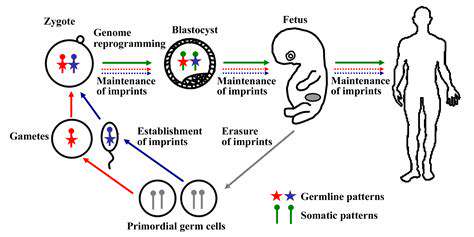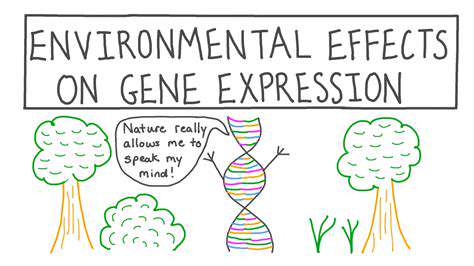The Impact of Genetic Predisposition on Health and Disease
The Role of Genetics in Disease Development

Understanding Genetic Predisposition
Genetic predisposition refers to the increased likelihood of developing a particular disease based on one's genetic makeup. This concept implies that individuals inherit certain alleles or gene variants from their parents that can influence their risk of developing health issues. These genetic factors do not operate in isolation; they interact with environmental influences, lifestyle choices, and other external factors. For instance, a person may have a genetic marker associated with heart disease but may remain healthy by maintaining a balanced diet and regular exercise.
Research has made significant strides in identifying specific genes linked to various diseases, from certain cancers to cardiovascular conditions. This genetic understanding aids in early detection and preventive measures, allowing healthcare providers to devise personalized treatment strategies. Mutations in genes like BRCA1 and BRCA2 are well-documented examples that showcase how genetics can influence one's probability of acquiring breast or ovarian cancer. Hence, individuals with family histories of such conditions may benefit from genetic screening and counseling.
Furthermore, genetic predisposition does not mean a definitive outcome; rather, it highlights a statistical likelihood. For many genetic traits, external factors, including diet, exercise, and stress levels, play a critical role in determining whether an individual will manifest the disease. Understanding this relationship can empower individuals to take proactive measures, like adopting healthier lifestyles to mitigate risks.
Overall, understanding genetic predisposition is essential in the realm of preventive health care. Genetic testing can help identify at-risk individuals who may benefit from increased surveillance and lifestyle modifications. As technology advances, the potential to tailor health interventions continues to grow, transforming the way we approach disease management.
The Influence of Epigenetics on Disease
Epigenetics is the study of changes in gene expression that do not involve alterations to the underlying DNA sequence. This field has emerged as a crucial area in understanding how genetic predisposition interacts with environmental factors. For instance, exposure to toxins, dietary choices, and even stress can lead to epigenetic modifications that influence disease risk. These modifications can potentially turn certain genes on or off, affecting an individual’s likelihood of developing various health issues.
One of the remarkable aspects of epigenetics is its potential for reversibility. Unlike genetic mutations that are permanent, epigenetic changes can sometimes be altered by lifestyle choices. For example, a person who adopts a healthier diet might reverse detrimental epigenetic marks, thus lowering their risks for diseases like diabetes or obesity. This aspect underscores the notion that, while genetics plays a significant role in health, lifestyle decisions can also have profound effects.
Recent studies have indicated that behaviors and environments experienced by earlier generations can influence the epigenetic landscape of descendants. This means that the impact of an unhealthy lifestyle or chronic stress in parents could potentially affect the gene expressions in their children even before they are born. Understanding these intergenerational effects is critical for public health initiatives aimed at disease prevention.
In summary, epigenetics adds a vital layer to the discussion of genetics and disease development. It shifts the focus from a deterministic view of genetics to a more dynamic understanding, emphasizing how our environment and choices interact with genetic predisposition. As research progresses, the implications of epigenetics will likely reshape the strategies we employ in disease prevention and health promotion.
Environmental Influences on Genetic Expression

Understanding Epigenetics and Its Role
Epigenetics is the study of changes in gene expression that do not involve alterations to the underlying DNA sequence. Environmental factors, such as diet, stress, and exposure to toxins, can influence these epigenetic modifications. This implies that our environment can significantly impact how our genes function, which can have profound repercussions for our health and disease susceptibility.
One of the key mechanisms of epigenetic change is the addition or removal of chemical tags on DNA and histones, proteins that package DNA. These modifications can turn genes on or off, thereby affecting cell function and behavior. As a result, even individuals with similar genetic backgrounds can have vastly different health outcomes based on their environmental exposures and lifestyle choices.
Recent research has shown that epigenetic changes can be temporary or permanent and may even be passed down through generations. This raises intriguing questions about the intergenerational effects of environmental influences, such as prenatal exposure to pollutants or maternal nutrition. Understanding epigenetics provides a more comprehensive view of how our health is shaped by the interplay between genetics and the environment.
The Impact of Lifestyle Choices on Genetic Expression
Lifestyle choices, including diet, physical activity, and stress management, play a crucial role in influencing genetic expression. For instance, a nutrient-rich diet can promote beneficial epigenetic changes that enhance gene function, while a diet high in processed foods may lead to harmful modifications. Consequently, maintaining a balanced diet is essential not only for overall health but also for optimal gene expression.
Exercise has been shown to have a significant impact on gene expression by influencing various biological processes that regulate health. Regular physical activity can induce beneficial changes, such as improved insulin sensitivity and reduced inflammation. These changes at the molecular level showcase the powerful connection between lifestyle choices and genetic predisposition in mitigating health risks.
Moreover, managing stress through mindfulness and relaxation techniques can also alter gene expression related to stress response pathways. Psychological stress can activate certain genes associated with inflammation and disease progression. Thus, adopting a holistic approach to health that includes managing lifestyle and environmental factors is essential for reducing the risk of genetic diseases.
The Future of Genetic Research

The Advancements in Genetic Technology
Recent years have witnessed tremendous advancements in genetic technology, paving the way for novel approaches to understanding health and disease. Techniques such as CRISPR-Cas9 gene editing and next-generation sequencing have revolutionized the field by providing researchers with powerful tools to manipulate genetic material effectively. This ability to edit genes could lead to breakthroughs in treating genetic disorders. Furthermore, these technologies enable quicker, cheaper, and more accurate sequencing of genomes, which enhances our understanding of genetic predispositions to various health conditions.
With the falling costs of genome sequencing, personalized medicine is becoming more feasible. Patients can receive genetic tests that provide insights into their risk factors for specific diseases, allowing them to make informed lifestyle changes or start preventive measures early. The intersection of genomic data and clinical practice can transform how we approach health care. This shift toward personalized approaches not only benefits individual patients but also the broader healthcare system by potentially reducing the incidence of costly chronic diseases.
Moreover, advancements are not limited to technology alone; there has also been significant progress in bioinformatics. The application of machine learning algorithms to genetic data has opened new avenues in predictive analytics, making it possible to identify patterns and correlations that were previously difficult to discern. These analytical tools empower researchers to interpret vast amounts of genetic data and may lead to identifying new biomarkers for diseases.
Lastly, with ongoing efforts to enhance public engagement in genetic research, we can expect a greater repository of genetic information gathered from diverse populations. This inclusivity is essential because understanding genetic predispositions requires a comprehensive view that accounts for both genetic and environmental factors. The future of genetic research looks brighter as collaboration between scientists, healthcare providers, and the public continues to foster a deeper exploration of human health.
The Ethical Considerations in Genetic Research
As the field of genetic research continues to evolve, it brings with it a host of ethical considerations that cannot be overlooked. Issues surrounding genetic privacy, consent, and the potential for discrimination based on genetic information are becoming increasingly relevant. Ensuring that individuals' genetic information is protected is paramount to maintaining public trust. Researchers and institutions must develop robust frameworks that prioritize ethical practices while advancing the science of genetics.
Moreover, the use of genetic data must be approached with caution, especially concerning who has access to this information. Policymakers are faced with the challenge of regulating how genetic data is used in healthcare, insurance, and employment contexts. The risk of genetic discrimination looms large if safeguards are not properly established, potentially hindering individuals from seeking testing for fear of repercussions.
It's also vital to consider the implications of gene editing technologies. While they hold the promise of curing genetic diseases, they also pose ethical dilemmas regarding the extent of human intervention in natural processes. As we consider the possibilities of creating "designer babies" or selecting traits, society must engage in dialogues about the moral landscape of such capabilities. Public discourse surrounding these advancements is crucial for responsible innovation.
To navigate these ethical challenges, collaborative efforts among scientists, ethicists, and the public are essential. Establishing comprehensive ethical guidelines can facilitate a balanced approach to advancing genetic research while safeguarding human rights and dignity. Moving forward, it is imperative that we promote transparent dialogue and inclusive conversations to address the ever-evolving ethical landscape in genetic research.
- The Unique Temperament of Every Dog: A Guide for Dog Owners
- Essential Needs for Your Dog's Health and Happiness
- Essential Dog Comfort Needs for a Happy Life
- Cleaner Air Can Reduce Respiratory Issues and Improve Overall Health
- Navigating Essential Nutritional Needs for Optimal Health
- Enhancing Mental Well being Through Daily Practices
- Key Signs to Recognize for a Healthier Life
- Recognizing Early Symptoms for Better Health Outcomes
- Comprehensive Guide to Managing Seasonal Allergies Effectively
- How to protect your dog from seasonal allergies
- Parasite prevention tips for dogs
- Why Did I Suddenly Start Vomiting? Causes and When to Worry